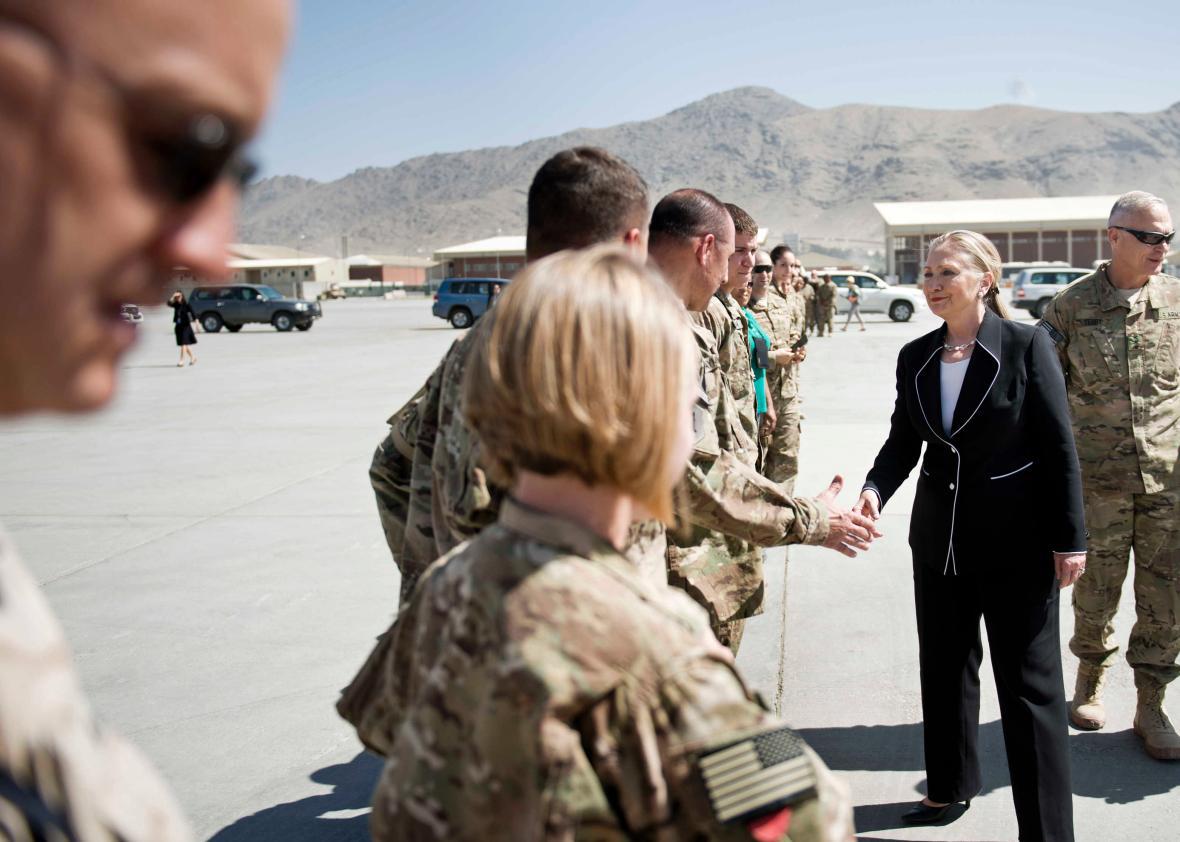In recent days, Hillary Clinton’s campaign has been putting out strong signals that she plans to take a more hawkish approach to foreign policy as president than Barack Obama. This is particularly true in the Middle East, where she is hinting that she will be tougher on Iran and friendlier to Israeli Prime Minister Benjamin Netanyahu’s government than her predecessor has been, if she wins. What’s unclear is whether this is pre-election signaling meant to appeal to national security–minded conservative voters wary of Donald Trump’s isolationism, or if it’s really a preview of what we can expect from her presidency.
Clinton adviser Michael Morell said in a speech at the Center for American Progress on Tuesday that U.S. allies in the Middle East should know that “We’re back and we’re going to lead again.” Morell said the U.S. should consider new sanctions on Iran and a new policy of having the U.S. navy board Iranian ships helping Houthi rebels in Yemen. This prompted conservative foreign policy columnist Eli Lake to hope that “if Clinton wins the presidency next month, she will be taking on not only Iranian aggression abroad, but also Iran’s apologists back in Washington.”
A long feature in the Jerusalem Post this week, featuring quotes from a number of Clinton advisers both on and off the record, also suggests that Clinton is far more suspicious of Iranian intentions than her former boss, and that she only “tepidly” went along with Obama’s landmark Iran nuclear deal. The piece also suggested that the Israeli government, the main international opponent of that deal, “sees in her a leader more comfortable than Obama with the exercise of traditional American power.”
Clinton herself pointed to her past support for strong sanctions against Iran as an example of “smart power” in an interview with the Wall Street Journal this week. The Journal article notes that this election has scrambled the traditional foreign policy debate, pitting interventionists in the establishment wing of both parties against the dovish liberals who supported Bernie Sanders and the isolationist Republicans who have flocked to Donald Trump. As I wrote in Slate’s preview of the third debate, one of the many unfortunate things about this election has been that neither of Hillary’s main opponents have had the inclination or ability to really challenge Clinton’s foreign policy views, or even draw out what they really are. This has allowed Clinton to give Obama’s more hawkish critics the impression that she’s one of them, without her ever really criticizing his handling of foreign policy in public—something that last year I naïvely assumed she would eventually be forced to do.
Republican national security figures ranging from centrist establishment types like Robert Gates and Colin Powell to neocons like Bill Kristol and David Frum are clearly disgusted with Trump, even if they won’t all outright endorse Clinton, so it’s not surprising her campaign thinks some hawkish voters may be persuadable. But to what extent do her views really line up with theirs?
We know from the positions Clinton took on internal Obama administration debates on Libya and Syria that she leaned toward interventionism far more than advisers like Ben Rhodes, Vice President Joe Biden, or Obama himself. Her key advisers, like John Podesta and likely future Secretary of Defense Michèle Flournoy, also lean toward intervention. Still, I don’t think America’s foreign policy priorities are going to shift overnight. Take the debate over establishing a “no-fly zone” in Syria, something consistently advocated by Clinton along with hawks in both parties (including, bizarrely, Trump’s running mate Mike Pence) but resisted by the Obama administration, which worries it would only escalate the conflict and increase the risk of direct confrontation with Russia.
In a 2013 speech at Goldman Sachs released by WikiLeaks, Clinton is far more cognizant of the risks such a strategy would involve than many of her public statements suggest. And in the third debate with Donald Trump, Clinton seemed to be backing away from the plan ever so slightly, saying she was “aware of the really legitimate concerns” about a no-fly zone raised by Obama and senior military commanders, and that it “would not be done just on the first day.” A recent column by Josh Rogin of the Washington Post suggested that there are internal divisions within Clinton’s team over Syria and that dramatic shifts from Obama’s cautious approach right off the bat are unlikely. Clinton may want a more active U.S. role in Syria but find that options for a productive way to intervene more are limited. And as my colleague Fred Kaplan pointed out in June, Clinton’s positions are often far more nuanced than she’s given credit for, even in her most “hawkish” moments.
All indications suggest that Clinton’s foreign-policy instincts are, indeed, different than Obama’s—that she believes he’s been too trustful of Iran, unnecessarily critical of Israel, overly cautious in confronting Russia, and far too unwilling to use U.S. military power to promote stability and protect strategic interests from Eastern Europe to the Middle East to the Pacific. Then again, George W. Bush probably didn’t expect in 2000 that he would launch the most ambitious nation-building project in half a century, and Barack Obama probably didn’t expect in 2008 that he was destined to become the father of open-ended covert drone warfare. The world has a way of surprising presidents, and they have a way of surprising their supporters.
